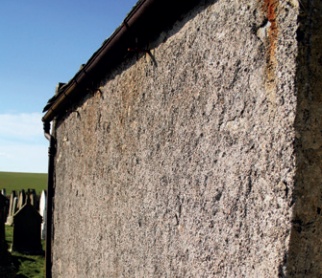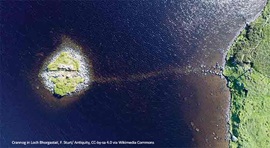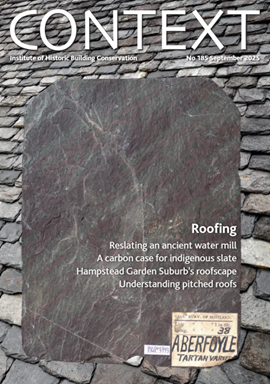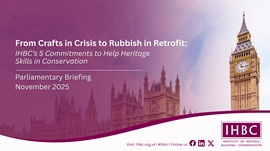Harl
‘Harl’, also known as ‘harling’ (or lime harling), is a technique for weatherproofing the exterior of masonry buildings, traditional to Scotland and Northern Ireland. It is commonly found on Scottish castles as well as more common building types, and was favoured due to its practicality and suitability for the harsh, wet climate.
The term ‘harling’ derives from the action of hurling wet mortar at a solid wall. This is known as a ‘cast-on’ finish, as opposed to a floated base coat (traditional to England), or rough-cast work such as pebbledash. In Ireland, it is commonly known as ‘wet dash’.
Harling consists of a slaked lime and coarse aggregate mortar which is thrown onto a stone wall, using a slurry of small pebbles or fine stone chips. By embedding a pigment in this material, the need for repainting can be avoided. A specially-shaped trowel is used to throw and then press the material into the surface. Cast-on coatings tend to provide better resistance to weather as the mortar is better compacted and more uniform throughout its thickness compared to trowelled-on coatings.
As the harl is mostly lime render it cures chemically rather than by drying, to provide a weather-protective and decorative coating. Once the harl is set it can be lime washed in various colours.
Short Guide: Climate Change Adaptation for Traditional Buildings, published on 10 July 2017 by Historic Scotland, defines harl as a: ‘Scottish form of roughcast in which the mixture of the aggregate (small even-sized pebbles) and binding material (traditionally sand and lime) is cast onto a masonry wall. In traditional harls the aggregate is within the mix (wet dash), in non-traditional 20th century harls the aggregate is dashed on separately (dry dash).’
[edit] Related articles on Designing Buildings
IHBC NewsBlog
RICHeS Research Infrastructure offers ‘Full Access Fund Call’
RICHesS offers a ‘Help’ webinar on 11 March
Latest IHBC Issue of Context features Roofing
Articles range from slate to pitched roofs, and carbon impact to solar generation to roofscapes.
Three reasons not to demolish Edinburgh’s Argyle House
Should 'Edinburgh's ugliest building' be saved?
IHBC’s 2025 Parliamentary Briefing...from Crafts in Crisis to Rubbish Retrofit
IHBC launches research-led ‘5 Commitments to Help Heritage Skills in Conservation’
How RDSAP 10.2 impacts EPC assessments in traditional buildings
Energy performance certificates (EPCs) tell us how energy efficient our buildings are, but the way these certificates are generated has changed.
700-year-old church tower suspended 45ft
The London church is part of a 'never seen before feat of engineering'.
The historic Old War Office (OWO) has undergone a remarkable transformation
The Grade II* listed neo-Baroque landmark in central London is an example of adaptive reuse in architecture, where heritage meets modern sophistication.
West Midlands Heritage Careers Fair 2025
Join the West Midlands Historic Buildings Trust on 13 October 2025, from 10.00am.
Former carpark and shopping centre to be transformed into new homes
Transformation to be a UK first.
Canada is losing its churches…
Can communities afford to let that happen?















